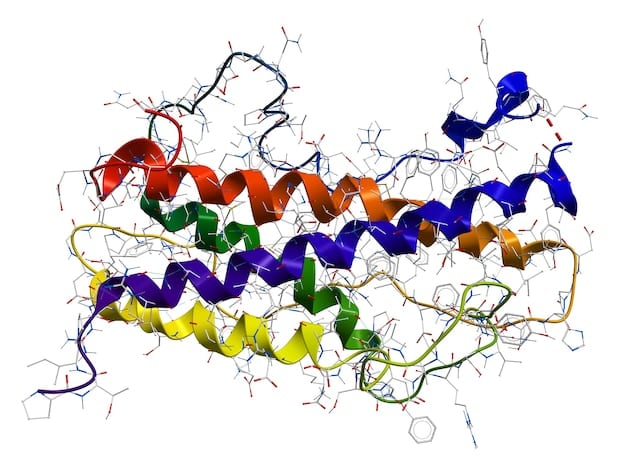Personalized Nutrition: Can Genetic Testing Improve Health by 15%? New Study Reveals

A new study explores whether personalized nutrition based on genetic testing can indeed improve health outcomes by 15%, examining the efficacy and potential benefits of tailored dietary advice.
Can your genes dictate your ideal diet? A groundbreaking new study explores whether personalized nutrition based on genetic testing can truly improve your health by 15%. Let’s dive into the science and see what the future holds for personalized eating.
Understanding Personalized Nutrition Through Genetic Testing
Personalized nutrition, driven by genetic testing, aims to tailor dietary recommendations to an individual’s unique genetic makeup. This approach moves away from generic dietary advice, suggesting that what works for one person may not work for another due to differences in their genes.
The concept hinges on the idea that genes influence how our bodies process nutrients, respond to different foods, and manage weight. By analyzing specific gene variations, personalized nutrition plans seek to optimize health outcomes.
How Genetic Testing Informs Dietary Choices
Genetic tests for nutrition typically analyze genes related to:
- Metabolism of macronutrients (carbohydrates, fats, and proteins)
- Vitamin and mineral absorption
- Sensitivity to certain foods (e.g., lactose, gluten)
- Risk factors for chronic diseases (e.g., heart disease, type 2 diabetes)
The Promises and Potential Pitfalls
While personalized nutrition holds promise, it’s essential to approach it with a balanced perspective. Here are a few considerations:
- Complex interplay of genes and environment: Genes are not the sole determinant of health. Lifestyle, environment, and overall dietary patterns play significant roles.
- Scientific validation: Not all genetic tests for nutrition have undergone rigorous scientific validation.
- Qualified guidance: Translating genetic information into actionable dietary advice requires expertise from registered dietitians or qualified healthcare professionals.
In conclusion, understanding personalized nutrition through genetic testing involves appreciating its potential benefits while acknowledging the complexities and limitations. It’s a field that requires careful evaluation and professional guidance.

The New Study: Methodology and Key Findings
A recent study has brought renewed attention to the field, investigating whether personalized nutrition based on genetic testing can improve health outcomes by 15%. The study employed a rigorous methodology to assess the efficacy of tailored dietary advice.
Researchers aimed to determine if individuals who followed genetically tailored nutrition plans experienced significant improvements in health markers compared to those who received standard dietary advice.
Study Design and Participants
- Randomized controlled trial: Participants were randomly assigned to either a personalized nutrition group or a control group receiving standard dietary guidelines.
- Diverse cohort: The study included a diverse group of participants with varying health backgrounds and genetic profiles.
- Follow-up period: The study spanned a significant period, allowing researchers to assess long-term effects.
Key Health Markers Assessed
The study tracked several key health markers to evaluate the impact of personalized nutrition, including:
- Weight management: Changes in body weight, body mass index (BMI), and body composition.
- Cardiometabolic health: Blood pressure, cholesterol levels, and blood sugar control.
- Inflammation: Markers of inflammation in the body.
- Energy levels and overall well-being: Subjective measures of energy, mood, and quality of life.
Initial Results and Observations
The initial findings of the study suggest that participants following personalized nutrition plans experienced statistically significant improvements in several health markers compared to the control group. The reported 15% improvement warrants further investigation.
Interpreting the 15% Improvement Claim
The focal point of the new study is the claim that personalized nutrition based on genetic testing can improve health by 15%. However, it’s crucial to interpret this claim with nuance and consideration.
The 15% improvement likely represents an average across multiple health markers and may not apply uniformly to all individuals or health conditions. A deeper look into the specifics is necessary.
Understanding Statistical Significance
Statistical significance indicates that the observed improvement is unlikely to have occurred by chance. However, it doesn’t necessarily translate to clinical significance, which refers to the practical importance of the improvement in real-world terms.
- Effect size: Consider the magnitude of the improvement. A small effect size, even if statistically significant, may not be clinically meaningful.
- Individual variability: Recognize that individuals respond differently to dietary interventions. What works for one person may not work for another.
Contextual Factors and Limitations
Several contextual factors can influence the interpretation of the 15% improvement claim:
- Study population: The characteristics of the study participants (e.g., age, health status) may limit the generalizability of the findings to other populations.
- Dietary adherence: The extent to which participants adhered to the prescribed dietary plans can impact the results.
- Control group: The nature of the dietary advice provided to the control group can influence the magnitude of the observed improvement.
In conclusion, interpreting the 15% improvement claim requires a balanced perspective, considering statistical significance, clinical relevance, and contextual factors. Further research is needed to validate and refine the findings.
The Role of Epigenetics in Personalized Nutrition
While genetic testing examines our inherited DNA, epigenetics explores how environmental factors can influence gene expression – essentially, how our genes are “turned on” or “turned off.” This interplay between genes and environment is crucial in personalized nutrition.
Epigenetic modifications, such as DNA methylation and histone modification, can alter gene activity without changing the underlying DNA sequence. Diet is a key environmental factor that can influence these epigenetic changes.
How Diet Impacts Gene Expression
Specific nutrients and dietary compounds have been shown to impact epigenetic processes:
- Folate and B vitamins: Involved in DNA methylation, which can influence gene silencing.
- Sulforaphane (from broccoli): Affects histone modification, potentially altering gene expression related to inflammation and detoxification.
- Curcumin (from turmeric): Exhibits epigenetic effects that may protect against chronic diseases.
Personalized Nutrition Beyond Genetic Testing
Incorporating epigenetic considerations into personalized nutrition can lead to more refined dietary recommendations:
- Lifestyle factors: Acknowledge the impact of factors like stress, sleep, and physical activity on gene expression.
- Nutrient timing: Consider how the timing of nutrient intake can influence epigenetic responses.
- Individual variability: Appreciate that epigenetic responses can vary significantly between individuals.

In conclusion, understanding the role of epigenetics in personalized nutrition allows for a more holistic and nuanced approach to dietary recommendations. It highlights the dynamic interplay between genes, environment, and individual health outcomes.
Practical Applications and Considerations
Translating the findings of studies on personalized nutrition into practical applications requires careful consideration. It’s essential to approach personalized nutrition with realistic expectations and informed decision-making.
While genetic testing can offer valuable insights, it’s not a magic bullet for optimal health. It’s one piece of the puzzle, and it should be integrated into a comprehensive approach that includes lifestyle factors, dietary habits, and professional guidance.
Choosing a Genetic Testing Service
If you’re considering genetic testing for nutrition, here are some factors to keep in mind:
- Scientific validity: Look for tests that have undergone rigorous scientific validation and are based on established genetic associations.
- Data privacy: Ensure that the testing service has robust data privacy policies to protect your genetic information.
- Qualified interpretation: Choose a service that provides access to qualified healthcare professionals who can interpret the results and provide personalized recommendations.
Integrating Genetic Insights into Your Diet
Here are some practical ways to integrate genetic insights into your diet:
- Consult a registered dietitian: Work with a registered dietitian to develop a personalized nutrition plan based on your genetic profile, health history, and lifestyle factors.
- Focus on whole foods: Prioritize whole, unprocessed foods that are rich in nutrients and support overall health.
- Monitor your body’s response: Pay attention to how your body responds to different foods and adjust your diet accordingly.
The future of personalized nutrition lies in further research, technological advancements, and a collaborative approach between healthcare professionals and individuals. As our understanding of the interplay between genes, environment, and health evolves, personalized nutrition will become increasingly sophisticated and effective.
The Future of Personalized Nutrition
Personalized nutrition is rapidly evolving, driven by advancements in genomics, data science, and technology. The future holds exciting possibilities for tailoring dietary recommendations to individual needs and optimizing health outcomes.
As we delve deeper into the complexities of gene-environment interactions and the human microbiome, personalized nutrition will become more refined and precise, promising a new era of preventive healthcare.
Advancements in Technology
Cutting-edge technologies are shaping the future of personalized nutrition:
- Wearable sensors: Continuous glucose monitors, activity trackers, and other wearable devices provide real-time data on metabolic responses and lifestyle factors.
- Artificial intelligence: AI algorithms can analyze vast amounts of data to identify patterns and predict individual responses to dietary interventions.
- Gut microbiome analysis: Understanding the composition and function of the gut microbiome can inform personalized dietary recommendations for gut health and overall well-being.
Ethical and Societal Implications
As personalized nutrition becomes more prevalent, it’s crucial to address ethical and societal implications:
- Data privacy: Protecting the privacy of genetic and health data is paramount.
- Equity and access: Ensuring that personalized nutrition is accessible to all segments of the population, regardless of socioeconomic status, is essential.
- Overselling and misinformation: Combating unsubstantiated claims and promoting evidence-based information is crucial to maintain public trust.
In conclusion, the future of personalized nutrition holds immense potential for improving individual and public health. By embracing scientific rigor, ethical principles, and technological innovation, we can unlock the full potential of personalized nutrition for a healthier future.
| Key Point | Brief Description |
|---|---|
| 🧬 Genetic Testing | Analyzes genes related to nutrition and metabolism. |
| 🍎 Personalized Nutrition | Tailored dietary recommendations based on individual genetic makeup. |
| 📊 Study Findings | Indicates potential health improvements, but requires careful interpretation. |
| 🌱 Epigenetics | Environmental factors influencing gene expression, crucial in nutrition. |
Frequently Asked Questions (FAQ)
What is personalized nutrition?
▼
Personalized nutrition is a tailored approach to dietary recommendations based on an individual’s unique genetic makeup, lifestyle, and health goals. It moves away from generic advice to offer custom dietary plans.
▼
Genetic testing analyzes specific genes related to nutrient metabolism, food sensitivities, and risk factors for chronic diseases, providing insights to create more effective and tailored dietary plans.
▼
Potential benefits include improved weight management, enhanced cardiometabolic health, reduced inflammation, increased energy levels, and an overall improvement in well-being. These benefits can vary based on individual compliance.
▼
While genetic tests are generally reliable, accuracy can depend on the test’s scientific validation and how well the results are interpreted. Consulting with professionals ensure a credible and sound information.
▼
Personalized nutrition may not be necessary for everyone. Individuals with specific health conditions or dietary concerns may benefit most. It is recommended to seek guidance from a dietitian to assess what works best for you.
Conclusion
The study on personalized nutrition and genetic testing offers a glimpse into the future of dietary science, suggesting that tailored nutrition plans could lead to measurable health improvements. While the findings highlight the potential of personalized approaches, it is important to interpret them with balance and consider the complexities of individual responses, lifestyle factors, and the need for ongoing research.





